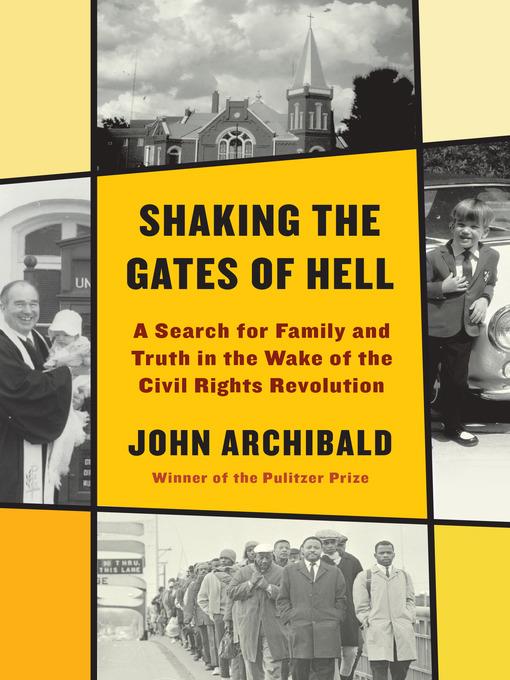
Shaking the Gates of Hell
A Search for Family and Truth in the Wake of the Civil Rights Revolution
کتاب های مرتبط
- اطلاعات
- نقد و بررسی
- دیدگاه کاربران
نقد و بررسی

December 1, 2020
Pulitzer Prize-winning journalist Archibald (The Birmingham News) presents a memoir exploring his childhood in Alabama as the white son of a preacher during the civil rights movement. His father was a warm, loving, moral presence in his life, yet Archibald aims to understand why his father had "a good heart and a pulpit and an inability to use it." Using written copies of his father's sermons, Archibald traces how the civil rights movement was barely mentioned except for veiled references in parables or metaphors. He also explores how this mindset was present in the larger Methodist community at the time and draws parallels to the treatment of the gay community during later years. His poignant reflections involve asking himself who he is, and who he would like to be. Archibald recognizes the inherent problems with judging another man in another time and also of his own moments of silence, but argues that studying the hypocrisy of the past is how change can occur today. VERDICT A powerful reflection on the influences of family and community and the ability to act justly in tumultuous times. Biography readers, especially those interested in reconciling the past, will be captivated by Archibald's honest, conversational style.--Anitra Gates, Erie Cty. P.L., PA
Copyright 2020 Library Journal, LLC Used with permission.

February 1, 2021
Evocative family history set against the brutality and transformation of the Jim Crow South. In his debut, Pulitzer Prize-winning Birmingham News journalist Archibald delivers a complex, fraught exploration of "the complicit and conspiratorial south I never came to see until I was fully grown." Descended from multiple generations of Methodist preachers, the author focuses on his father, Rev. Robert--as represented by family memories and his archived sermons--with a mixture of pride and exasperation, recalling his wisdom and kindness and lamenting his glacial approach to acknowledging the moral wrongs of segregation. Robert's genteel struggle with the horrific racial violence of 1960s Alabama seems emblematic of both a generational moment and transformations in public spiritual narrative. Archibald tracks how his father's sermons at first reluctantly broached the moral evils embodied by the Birmingham church bombing, the violence of Bull Connor, and the callousness of George Wallace. "It was clear he was not the only preacher struggling to find his voice," writes the author, "stuck between the Bible and a hot place." Archibald demonstrates how Robert's struggles reflected the larger landscape, how "the church was in conflict nationally....Alabama Methodists also condemned preachers who dared to participate in civil rights demonstrations, saying it wasn't their place." The author recalls fascinating anecdotes of ordinary people taking risky stands against the status quo. When his father finally advocated for civil rights from the pulpit, "he was finding a voice, even if it was as halting and hesitant as racial progress in the South." Archibald grapples further with this challenging legacy, including the history of his slave-owning ancestors and his beloved grandfather's predilection for blackface performance. Ultimately, the author ruefully concludes, "I guess evil is hardest to see when it's all you know in your time, whatever time that might be." He also gratefully notes that a Black preacher recalled that Robert "was on the right side of history." A sincere, poignant synthesis of memoir and social history of a troubled time.
COPYRIGHT(2021) Kirkus Reviews, ALL RIGHTS RESERVED.

Starred review from April 19, 2021
Archibald, a Pulitzer-winning columnist for the Birmingham News, looks back at his sheltered Dixie childhood during the civil rights era in his captivating debut. As the son of a Methodist preacher, Archibald witnessed history through the passive eyes of his father, Rev. Robert Archibald, who “preached of stewardship” to his congregation in 1960s Birmingham, “where black people hold a political and physical majority and hold desperately to economic scraps,” without once mentioning race, justice, or protests. What makes this retelling exceptional is the poetic voice of the author as he reflects on the Montgomery bus boycott, the bloody campaigns in Selma and Birmingham, lynchings, and the murder of Martin Luther King Jr. “Images of real sacrifice run through my head in black-and-white newsreels... I see the blood spatter from MLK and Malcolm X... and Viola Liuzzo after the march from Selma to Montgomery. Nobody—no family—should have to sacrifice like that.” While the nation erupted in racial discord, his father and other white Southern pastors ignored the mayhem in a “conspiracy of silence.” It wasn’t until his father died that Archibald, then in his fifties, truly faced the injustices of his childhood. “Why have a pulpit if you will not use your voice in all the ways you can?” This personal interrogation is a moving testament to the power of reexamining one’s past.

























دیدگاه کاربران